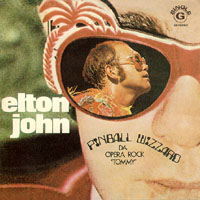

It did nothing at the time, he says, until a 2003 remix championed by Fatboy Slim sent it to No 1. He explains that the latter was inspired by Philadelphia International Records, which prompted him to record his next song, Are You Ready for Love, with label producer Thom Bell in 1979. Other than Daniel, from 1973’s Don’t Shoot Me I’m Only the Piano Player, which the crowd seem to know less well, the hit rate never drops: Goodbye Yellow Brick Road is wistful and sees the crowd sing the chorus for John Philadelphia Freedom charges forward. The latter is a dreamy reverie, one of those rare perfect songs about the joy of hearing a perfect song it feels almost cosmic to hear it live. Then there’s the unapologetic self-celebration of The Bitch is Back, on which he lets out a number of vivid vocal trills, and a magnificently funky, loose Bennie and the Jets. Backed by a big firework display, he opens with the rallying piano of Pinball Wizard, with its Led Zeppelin-indebted guitar solo. The set starts with a run of seemingly self-referential hits about what it means to be such a master. His crack, tour-honed band somehow manage to be deep and funky yet sound utterly weightless, letting these killer songs float among the Pyramid stage flags. But although he looks a little stiff when he occasionally rises from his piano stool, his energy is gleefully pugnacious, his piano playing vigorous and thrilling, his face occasionally flashing with an expression that suggests: “’Ave it!” He jabs at the crowd like a real showman – even flexing his muscles on Saturday Night’s Alright for Fighting – and looks rightfully pleased with himself when the tens of thousands of people here lose it. In recent years, there have been some concerns about his health and his ability to keep performing at this level. But these are timeless songs that tell John’s complex story, refracting the pleasures and pains he has survived to become a living legend.Īnd John is in utterly vital form, clad in a shiny gold suit and black-rimmed, orange-lensed glasses. The vast majority of this show dwells in the 70s, which some may see as an admission of defeat for an artist who is still releasing records, not to mention famously being a new music fan. Unlike other legends of British pop who have played this slot – Macca last year, say – he’s stripped out all the deep cuts to play wall-to-wall hits, deviating from the setlist of his ongoing Farewell Yellow Brick Road tour.

This, then, isn’t really one for him, but one for us. “It’s a very special and emotional night for me as it may be my last ever show in England, so I better play well and entertain you as you’ve been standing there so long.”

“I never thought I’d play Glastonbury and here I am,” he says. True to form, when the 76-year-old performer addresses the crowd at the Pyramid stage – surely one of the busiest ever – it is with subtle caveats. John hands the baton so much, in fact, that at one point he’s joined by a lesser-known artist here, Steve Sanchez, a charismatic American singer-songwriter who plays his own viral hit “Until I Found You”, and who gushes earnestly about John before he begins.Elton John’s debut at Glastonbury is also meant to be his last ever performance in the UK – though it’s by far not the first time he has sworn he’s retiring only to make a subsequent return. Later, up steps Rina Sawayama, dressed incredibly, in a strikingly see-through dress, to do the Kiki Dee part in “Don’t Go Breaking My Heart”, while an unnervingly smart Brandon Flowers takes on “Tiny Dancer”. First up is the magnificent Jacob Lusk of Gabriels, who sings “Are You Ready For Love” alongside the London Gospel Community Choir – the first truly major moment.

But it also feels like a subtle handing of the pop baton to the next generation, who John each introduces like he’s on his radio show, outlining how he discovered them with genuine enthusiasm. Sunday’s performance is partly a trip down memory lane. The ballad section, meanwhile, is moving: “Your Song”, that rousing, lyrical masterpiece, provides another stellar singalong, before the original version of “Candle In The Wind”, with footage of a Marilyn Monroe lookalike glugging from a glass of wine, and “Don’t Let The Sun Go Down On Me”, which John chooses to sing alone, without someone taking Michael’s part, are received with fists-in-the-air jubilation.


 0 kommentar(er)
0 kommentar(er)
